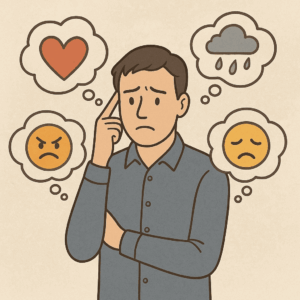Alexithymia: When Feelings Have No Words
 Most of us can put our emotions into words—whether it’s joy, sadness, anger, or love. But for some people, feelings are much harder to identify, describe, or even notice. This difficulty has a name: alexithymia.
Most of us can put our emotions into words—whether it’s joy, sadness, anger, or love. But for some people, feelings are much harder to identify, describe, or even notice. This difficulty has a name: alexithymia.
The word comes from Greek roots:
-
a = lack of
-
lexis = words
-
thymos = emotions or feelings
In essence, alexithymia refers to “no words for feelings.” It is not a mental illness in itself but rather a personality trait or a dimensional construct seen across various psychiatric and medical conditions.
Key Features of Alexithymia
People with alexithymia may experience:
-
Difficulty identifying feelings: They may not recognize if they are sad, angry, or anxious—only aware of bodily sensations like tightness in the chest or fatigue.
-
Difficulty describing feelings: Even when they notice emotions, putting them into words can feel nearly impossible.
-
Externally oriented thinking: A focus on facts, events, or physical symptoms rather than inner experiences.
-
Limited imagination or fantasy life: Reduced use of dreams, daydreaming, or imaginative play.
Causes and Associations
Alexithymia is not explained by a single cause. Research suggests a mix of:
-
Biological factors: Altered brain circuits involving the anterior cingulate cortex, insula, and amygdala.
-
Developmental experiences: Early emotional neglect or trauma may impair emotional awareness.
-
Psychiatric associations: Commonly seen in depression, anxiety disorders, post-traumatic stress disorder, and personality disorders.
-
Medical and neurological conditions: Notably prevalent in autism spectrum disorder, traumatic brain injury, and certain psychosomatic illnesses.
Alexithymia in Daily Life
-
Relationships: Struggles to express affection, empathize, or respond emotionally can create misunderstandings.
-
Physical health: Because emotions are often felt as physical symptoms, people may frequently seek medical help for unexplained somatic complaints.
-
Mental health treatment: Difficulty articulating feelings makes psychotherapy more challenging.
Assessment
Several tools exist to measure alexithymia, the most widely used being the Toronto Alexithymia Scale (TAS-20). Clinicians also assess it through clinical interviews and observation of affective expression.
Approaches to Management
While alexithymia cannot be “cured,” interventions can help improve emotional awareness and expression:
-
Psychoeducation: Teaching individuals about the nature of emotions and their role.
-
Psychotherapy:
-
Cognitive-behavioral approaches help in linking thoughts, emotions, and behaviors.
-
Mindfulness-based therapies encourage noticing emotions in the present moment.
-
Emotion-focused therapy can build emotional vocabulary and recognition.
-
-
Creative therapies: Art, music, and drama therapies may bypass verbal barriers.
Progress may be gradual, but increased awareness can enhance relationships, coping, and overall well-being.
Final Thoughts
Alexithymia is often invisible because it does not stand out like overt symptoms of anxiety or depression. Yet, it has a profound effect on how people relate to themselves and others. Recognizing it is the first step toward supporting individuals who live in a world where emotions are felt but not easily spoken.
👉 Dr. Srinivas Rajkumar T, MD (AIIMS, New Delhi), DNB, MBA (BITS Pilani)
Consultant Psychiatrist
Apollo Clinic, Velachery, Chennai
📞 8595155808